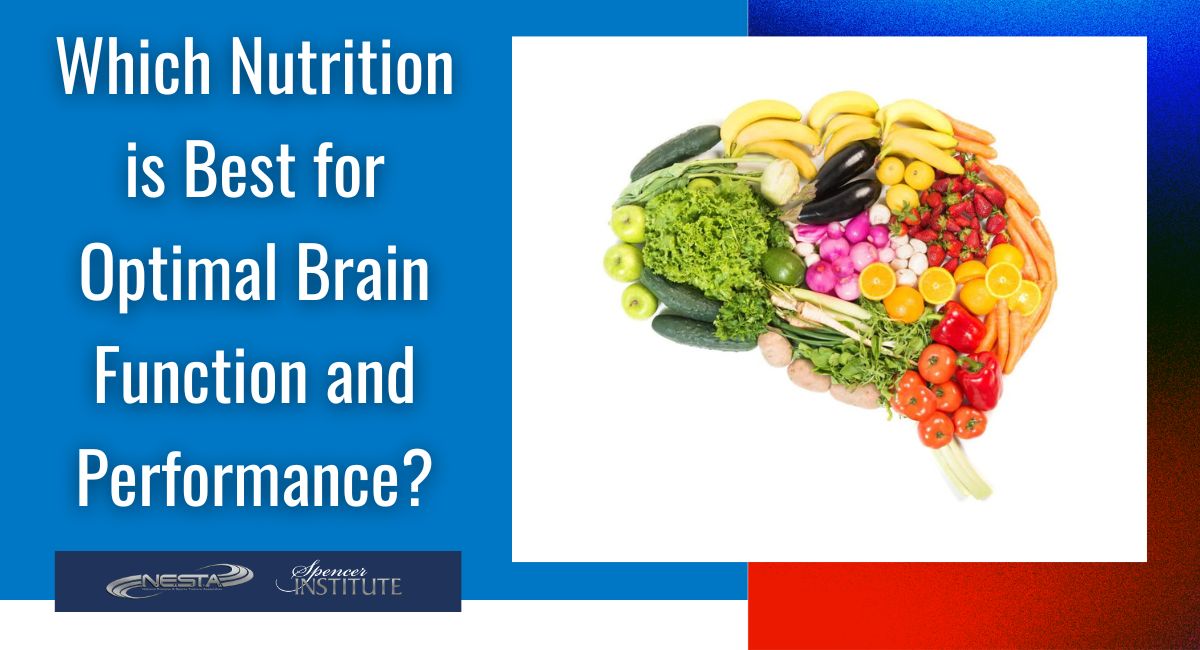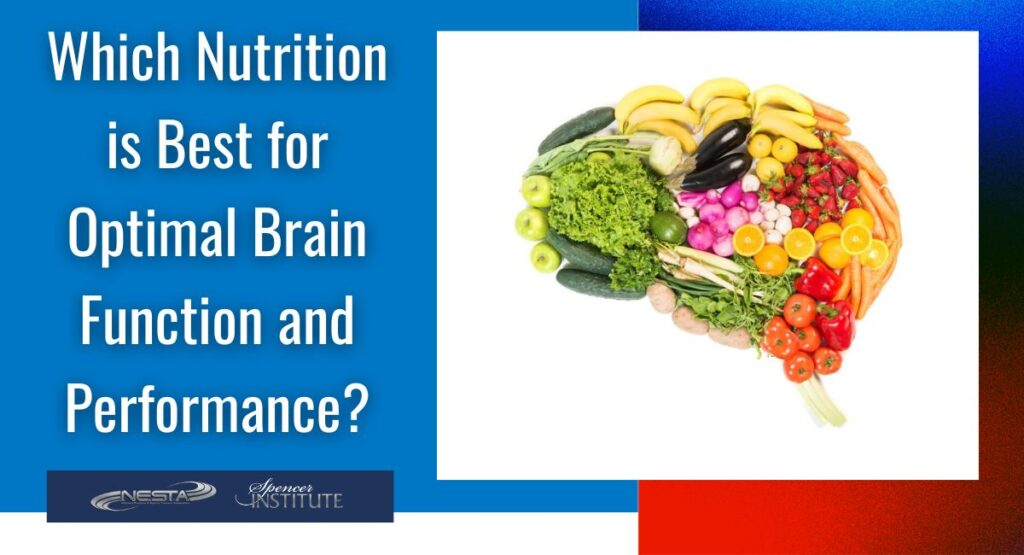
What we eat and drink is maybe one of the most important factors in supporting brain health. Clients who make changes in chronic deficiencies with vitamins and minerals needed for healthy brain function report feeling changes immediately after resolving where they may come up short in their dietary intake. As their Coach, we want to guide our client to live their life to their fullest and this can mean, at times, that we have our work cut out for us with clients as we strive to enable them to embrace changes that endure for weeks, months, and years; ideally, we want these changes to ‘”stick” for a lifetime. This part of brain fitness coaching may be one of the most important elements of any brain-centric plans you collaborate with clients on. What we choose to eat and drink literally impacts whether we will have optimal cellular functioning or not!
In developed western cultures, diets are considered insufficient for long-term health. This often results in the use of supplements – including vitamins and minerals, protein, antioxidants, amino acids, essential fatty acids, medium chain triglycerides, fiber, and digestive enzymes, to maintain optimal cellular metabolism.
To understand all this more completely, you may also want to read this post about brain anatomy and physiology.
Additionally, the typical western diet is comprised of excess sugar, sodium, trans fats, artificial flavorings, and food dyes, along with chronic exposure to endocrine- disrupting chemicals that impact our health, including plastics, pesticides, fungicides, fertilizers, herbicides, heavy metals, and industrial compounds, to name a few.
Most of the nutrient recommendations from this lesson are suggested that your client can achieve health goals. Furthermore, they will have added complementary effects on the systems that we all rely on to operate optimally.
Current Nutrition Trends for the Brain Optimization
Is it possible to get adequate nutrition readily available through food? Is this nutrition enough to support what our brain needs? We often think of our physical being when considering nutrition; by now, you can see that the need for quality, nutrient dense intake is also vital to our brain health. Foods grown in – or with – pesticides are toxic to our body and many food additives found in the products we buy at the store create a need for awareness on the part of all consumers. Our choices must support our health goals. Food and nutrients are powerful modulators of our health and since we consume on average three meals a day (equaling more than one thousand meals in a year) which can result in having a significant impact on overall health.
Human lifespan has been averaged to be approximately 79.3 years; calculating the meal totals this represents, we will normally consume over 85,000 meals in a lifetime. Coaching a client to incorporate some of the recommendations you are learning now into a daily regimen will work to support your health goals – including brain health – by providing some of the key nutrients found lacking in many people.
Even though a strong evidence body of research exists in support of each one of the nutrients that follow, everyone is unique; these differences must be uncovered by the Coach. Obviously, this demonstrates the need to do an exhaustive assessment of the client, and this requires that we have their confidence and trust.
To begin, a client seeking a detailed assessment of their health requires a program or strategy that is tailored to their unique biochemistry (lab work/bloodwork). This can be done by either a primary care physician, or one specializing in functional medicine. Unless you are qualified to do so, you can rely on a health professional to assist you or your clients in getting the necessary nutrients into alignment at optimized levels. Adding the right supplements and nutrients should give your client the power needed to allow the immune system to work at its peak, while supporting the body physically.
Coaches should always define recommendations for clients; this means we go beyond instructing a client to consume a healthy diet. We encourage specific examples for the intake of high-quality whole foods containing a rich supply of vitamins, minerals, antioxidants, enzymes, and phytonutrients needed for optimal health. In the USA, The Centers for Disease Control (CDC) provides information on morbidity and mortality. In nearly every annual report, the findings are clear – that only 1 in 10 Americans eat enough fruits and vegetables daily. Additionally, The CDC found that Americans eat just one fruit serving per day and less than two vegetable servings per day. This is simply having disastrous effects on our morbidity and mortality figures. The most common nutrient deficiencies are vitamins D, E, A, C. Deficient nutrients with the greatest need for improvement are magnesium and calcium. This data is clear evidence, demonstrating that a majority of Americans would benefit from supplementing our daily intakes with a high-quality multivitamin and mineral supplement of high quality to ensure balanced nutrition and antioxidant support.
What makes a multivitamin high quality? multivitamin should come from a whole food source which includes fruits vegetables and greens it should provide antioxidant support as well as digestive enzyme support. Having an optimal essential fatty acid profile is required for health and vitality.
As noted in the earlier lessons the highest concentration of essential fatty acids are in the brain so a depletion will influence brain health.
The DHA component of omega-3 fatty acids supports synaptic structure and membrane fluidity. The EPA component of omega-3 fatty acids supports vasodilation and helps to decreased blood viscosity. Omega-3 fatty acids also aid cellular communication; they enhance cognitive function, they are a potent modulator of mood and they help support the growth of hair, skin, and nails. If skin appears dry, or if hair seems brittle, you may want to consider recommending clients add more omega-3 fatty acids into their diet.
Spirulina for Brain Health
Spirulina is an incredible superfood. It is essential to weight management; it provides cellular energy which enhances stamina and its high protein content maintains muscle mass. In studies, spirulina has been shown in some studies to prevent atherosclerosis and a host of other benefits, including reductions in elevated blood cholesterol levels. Like all supplements, spirulina needs to be evaluated more completely before it can be widely recommended to all without some caveats. For example, spirulina is known to contain no Being deficient in vitamin B6 means that the ability to convert the amino acid tryptophan to serotonin is decreased – and a medical/health professional needs to verify this. Again, as with all supplements, consulting with a physician first is always a smart choice.
Folate is a Brain food
Folic acid must be converted into a biologically active form called 5 MTHF, or 5-methylfolate to cross the blood-brain barrier and function optimally. It is estimated that 30-50% percent of individuals have mutations in the enzyme that allows an individual to make 5- methylfolate and for a client with this as their reality, supplementing with this nutrient is important for their health.
Folate, itself, is considered a brain food and is needed for energy production. Since it’s a coenzyme in both DNA and RNA synthesis, its role in healthy cell division and replication is well-documented. Folate also promotes the formation of red blood cells and supports immune function by aiding in the formation and functioning of white blood cells. Additionally, folate supports muscle repair, helps to nourish the brain and may be effective in supporting mood. This is believed to be the case since it is also essential to neurotransmitter production. Low folate levels have been found in females and athletes, and supplementation is extremely valuable for those deficient.
It is now believed that usable vitamin B12, and in fact, spirulina supplements are not considered to be a reliable source of vitamin B12, as they contain what is known as a pseudo vitamin B12 variant, which is biologically inactive in humans. Some researchers suggest that this may also prevent the absorption of B12 from non-spirulina sources. This is important to note, as the B vitamin group is essential to maintaining optimal brain function; B vitamins support the central nervous system and are critical to produce neurotransmitters.
Homocysteine
Folate is the most important nutrient regulating homocysteine levels. Homocysteine is formed from the breakdown of the amino acid methionine. The human body requires adequate amounts of folate b6 and b12 to convert it into a non-harmful amino acid.
It is now believed that elevated homocysteine is a risk factor for Alzheimer’s disease supplementation with B vitamins and folate is a best-practice nutritional strategy to significantly reduce this risk.
Stress depletes B vitamins. Working or living in an environment that promotes excess stress would be detrimental on overall heath and it may be necessary to include B vitamins and a folate or methyl folate supplement complement a sound approach to beat back stress using food intake.
Rich sources of natural folate include spinach, asparagus, Brussels sprouts, and eggs, but it is also found in nuts, seeds, meats, fish and legumes.
Vitamin C is a powerful antioxidant helping to supercharge other antioxidants, including vitamin E, and is found in berries, citrus fruits and green vegetables. Vitamin C is essential for overall brain health and is considered a primary line of defense against many types of free radicals. With its many beneficial effects on the body, it is recommended that your client supplement this vitamin if they do not get it from their dietary intake. The benefits include strengthening vision, enhancing HDL cholesterol production, promoting collagen formation, serving as a building block for neurotransmitter genesis, strengthening the immune system (it has powerful antiviral properties) while supporting lower total cholesterol, ideal blood pressure and the risk of stroke by preventing damage to arterial walls.
Vitamin D
Vitamin D plays a role in supporting in optimal health, this has been proven in thousands of research studies over time. Vitamin D is unique because, as a fat-soluble vitamin, it also holds properties of both a steroid and a hormone. It is known to be required for the absorption of calcium and phosphorus, making it important for normal growth and development of bones it helps to protect against muscle weakness and has strong evidence-based research to back its efficacy in the prevention of breast colon prostate and pancreatic cancer; it is also reported to be a powerful immune enhancer, protecting against viruses, bacterial infections, and autoimmunity disorders.
Vitamin D deficiency is at nearly epidemic proportions if we are to believe the National Institute of Health (NIH) data, which states that over a billion people worldwide are lacking in this crucial vitamin. If we know that vitamin D influences up to 3000 genes it plays an essential role in optimal health on lab tests.
The normal reference range for vitamin D is between 20 and 80 ng/mL. More than 85% of those tested fall within this range (there is considerable variation in the guidance for intake). However, supporting brain health means that we want these levels to be more toward the upper end of this range, since so many of our bodies’ processes rely on vitamin D intake being sufficient.
With this in mind, we can make a case for intake to be closer to a range from 60 to 80 ng/mL. And since sunlight is the ideal way to take in vitamin D, we need to know where our client is – physically – between the hours of 10AM to 2PM when vitamin D absorption is at its highest. A Coach can safely recommend supplementing vitamin D until it is restored to values supporting optimized health.
The benefits of vitamin D are many. To begin, it is reported to provide powerful immune support; to be able to prevent colds and infections from becoming more severe, it is safe to recommend vitamin D supplements if the client does not have enough intake from food sources.
Lower levels have been associated with different autoimmune conditions, including multiple sclerosis, Hashimoto’s Disease, and irritable bowel syndrome (including Crohn’s disease and ulcerative colitis). Vitamin D is essential for brain health: depression and Alzheimer’s disease have been associated with low vitamin D levels.
As a preventative strategy, ensuring enough intake of vitamin D is easy. But the benefits are systemic, not just for the brain. Among trainers and coaches who work alongside clients in physical settings (gyms, most commonly), vitamin D
is essential for bone and muscle health. To support bone health, the body requires calcium, potassium, and magnesium – along with vitamin D. Muscles also require adequate vitamin D for optimal functioning, and low vitamin D has been associated with osteoporosis in females.
There is an abundance of evidence in the literature for vitamin D and cancer prevention, vitamin D promotes cells staying together versus unregulated cell growth low. Vitamin D is still being researched for effectiveness in lowering the risk for other cancers, including breast, prostate, colon, ovarian, and melanoma.
A deficiency in vitamin D has also been associated with a greater amount of inflammation in the body, higher blood sugar, and resistance to insulin. Since this can lead to a preventable condition (diabetes), Coaches are advised to understand client intake levels of vitamin D. This does not mean you are doing blood work and evaluating results – but you can certainly ask about intake and determine if there is a need to supplement.
Probiotics to Improve Brain Health
If your client takes antibiotics, drinks coffee, craves sweets, has bloating from gas, or yeast infections, they may need probiotics.
Probiotics are beneficial bacteria present in the digestive tract they are vital for proper digestion and perform many useful functions including preventing the overgrowth of yeast and pathogens in addition to the synthesis of essential vitamins and neurotransmitters.
Overgrowth of unhealthy bacteria in the body is believed to coincide with excessive grain consumption and many medications including antibiotics can cause dysbiosis of the gut bacteria. Reintroducing healthy bacteria into the gastrointestinal tract will result in many areas of health improving.
The probiotics most often used include lactobacillus acidophilus (common in yogurts) and the fideobacterium bifidium. Adding a high potency probiotic with a wide range of bacterial species will serve to improve the absorption of nutrients, vitamins, and minerals. It will also support production of vitamin K2 enzymes. B vitamins will promote a healthy immune system, enhance the creation of bile for improved digestion of fats and will protect the body from pathogenic bacteria.
Suggest rotating probiotics every three months to ensure a broad range of bacterial species. Cultured and fermented foods, including kombucha, kefir, miso, sauerkraut, tempeh, and yogurt can also serve to broaden and diversify bacterial species and contain health-promoting substances that serve to boost energy detoxify the body and promote enhanced immune support.
If you’d like a career helping people optimize brain performance, consider the Brain Fitness Coach Certification. If you would like to explore more of the nutritional aspect, look at the Fitness Nutrition Coach or Holistic Nutrition Coach courses.






